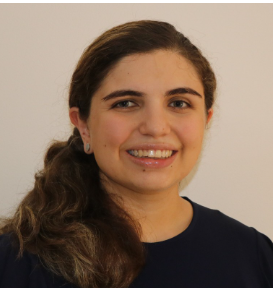Campus Leader Profile: Carolina Mellado
An inspiring story unfolding here and now at Landmark College.

Photo from LinkedIn
December 12, 2022
I was assigned to find someone on Landmark College campus to write a leadership profile on. Through my class, I’ve learned that there are many kinds of leaders. Like everybody else, they come with different traits, skills, and styles. Sometimes people seem to just be born with innate leadership ability, and sometimes that ability is hard won through trials and determination.
Some leaders, like activists, are visionary. They see the status quo, the “norm”, and see what needs to be changed. Then, they go work to make that change in society.
I did not have to look far to find an activist leader on our campus. My fellow student Carolina Mellado is a founding member of the Pa’lante center, a center for Latinx culture on campus. It is designed to be a place where the growing number of Latinx students on campus can connect with each other and to the cultures of Latin America. For those who, like Carolina, have been raised and grew up in Latinx culture, it’s important to have a space where that connection can be honored and maintained. We are a school where diversity is celebrated; with Carolina, a vision of diversity and inclusion grows brighter for Landmark.
Pa’lante is Spanish for “onward” or “moving forward”. It is a fitting name for a center which has had grassroots momentum from the start. Marc Thurman, Director of the Centers for Diversity and Inclusion here at Landmark College, says the Pa’lante center started a year ago. Thurman says he personally knows the discomfort of being in a new environment and looking for one’s own space. A feeling which Carolina also felt when she first got to Landmark.
But there wasn’t a dedicated space to begin with. Pa’lante has its origins at the RISE UP Center, another gathering place “for all students who identify as people of color to organize, collaborate, and build community amongst themselves as well as the outside community.” It was within this nurturing and empowering atmosphere that the seeds of Pa’lante took root.
Carolina, along with a few other student leaders, took initiative by creating and hosting Latinx programs at RISE UP. “Angel and Carolina were the first two that were doing programs that connected to the Hispanic and Latin X community here at Landmark College and they connected with me on programs to be on campus” says Thurman. These included watching films from south and central America and guiding discussions about issues of acceptance and diversity in society. There were some fun activities like a celebration of Day of the Dead, or Día de los Muertos, a Latin American celebration of life and death (primarily celebrated in Mexico).
These Pa’lante programs engaged and attracted new students, some of whom were inspired enough to start volunteering with Carolina. With growth and increasing student interest, word rose to the Dean of Students, the Vice President, and President of the College that a center of Hispanic and Latinx culture was on the rise and would need a space of its own.
While it would take about a year for Pa’lante to move into its current location, Carolina continued delivering programs anywhere she could on campus, including writing clubs, coffee house meetings, and more. Marc describes his observations of Carolina during this time “she is sharing it with others and brought everyone together. That’s what Landmark is all about, coming together.”
One of the most important traits of any leader, and one which Carolina possesses in abundance, is perseverance. Thurman says, “she’s willing to put the time in to make it happen, and she put the time in with program ideas”. Carolina is determined to accomplish goals. She confidently informed me in our interview, “I am one who doesn’t like to easily give up”. The evidence affirms as such.
Carolina says her current challenges at the Pa’lante center are finding ways to implement the Latinx cultural aspects in classrooms. Why is that important? “We’re able to really expand the mind and allow the student who is from a different place to see themselves not only in the classroom, but also in the work.” Thurman says. It would have benefits for everyone. Incorporation of Latinx history and culture into education would expand the mind by considering other viewpoints (this is college, after all). Aside from this, it would send a signal to our Latinx students that their history is important. Thurman also told me, “You know how great it feels to write about someone that connects to you, who you are, to your roots? It feels amazing. It makes me feel like a part of the community.” Carolina is working toward seeing this vision of inclusivity become reality. However, she also knows that it is hard work to make changes that may not happen quickly.
What sustains Carolina are the many sources of inspiration in her life. First and foremost, she credits other people for helping her move forward. She says of her parents “They inspired me to push for and fight for what I believe in and that I can be someone who is capable of enacting change.” Through the support of her parents, Carolina believes she has grown to have grit and determination, while also remaining kind. Carolina feels empowered when she sees CDI director Marc Thurman speak with passion and energy about the issues and subjects discussed in the Pa’lante center.
Carolina also has her own passion and energy which she shares with others too. Anyone who knows Carolina says she is a “people person”. Carolina says, “I always seek the input of my coworkers because I find it important to have the feedback from your whole team.” That ability to connect and listen to people around you is a valued skill for a leader to have.
My last question for Marc was, is there anything else that belongs in an article about Carolina’s leadership? His response was that Carolina has a strong sense of “why”. “We’re here to enjoy the culture be one with each other.” Says Thurman. “I think sometimes when you in activist work, people make things too serious all the time. But Carolina is always like, ‘where’s the music? We got to make sure we have the snacks.’ You know, it’s just those little things.” Carolina keeps people rooted to the “why” while also keeping things light and fun.
When Marc sees student leaders like Carolina emerge, he’s identified two stages of their growth. The first stage is sharing passion, bringing people together, working with determination and grit, and developing leadership skills. The reason for this work is simple; It is a leader’s personal need to have a space for themselves. Marc says it was this way for him, “I think the “why” is, at first, it was for me.”
In a way, this is an essential step for leaders to develop a strong connection to the community and project that will eventually outlast them.
The second stage, Marc describes, is when the “why” stops becoming about oneself and more about those who will come afterward. “The second [stage] was, it’s not about me. It’s about the next Latino Hispanic student that comes in needing a space of their own. Now I know they will.”
Marc says he has seen Carolina grow from the time she started to the present. She is thinking about legacy and future of Pa’lante center. Carolina may have started as a student leader, but she has only kept moving forward.





